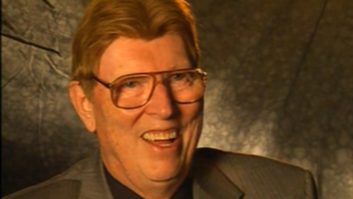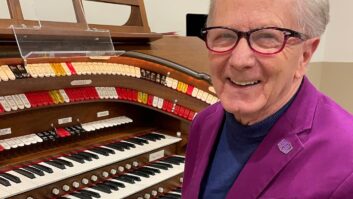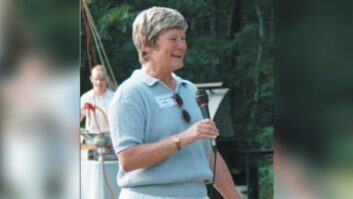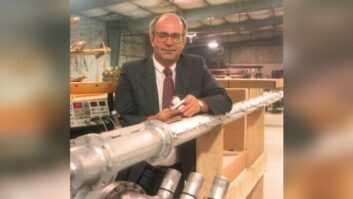
Broadcast equipment entrepreneur and inventor Steve Church has died at the age of 57. He had brain cancer.
Church is credited with an important role in the development of modern telephone talk show technology, audio coding and IP audio networks as used in broadcast facilities. For his work he received the NAB Radio Engineering Achievement Award in 2010. He was the founder and majority owner of Telos Systems, which through mergers and growth would expand to four divisions that include the Omnia, Axia and Linear Acoustic brands.
Church quietly fought cancer since hearing the diagnosis about three years ago.
In the mid-1980s Church was working as chief engineer of WFBQ(FM) and WNDE(AM) in Indianapolis, where he also worked part-time as a talk-show host. The intersection of his technical and on-air experiences helped prompt development of his seminal product, the Telos 10 telephone hybrid, considered the first broadcast studio product that used digital audio technology. It was credited with helping many radio and TV stations air phone calls with clarity; it coincided with a wide expansion of the talk format on U.S. radio stations.
According to an obituary written by Church’s colleague Frank Foti, “The significance of his hybrid product achievement is deeply rooted in prior work done at Bell Labs in New Jersey. Actually, his success was based upon a lack of success by some well-thought-of Bell Labs engineers and scientists.” Decades before, Foti, wrote, Bell Labs had commissioned engineers to seek a method to eliminate a form of distortion known as sidetone on long-distance telephone lines. The engineers ultimately published a paper saying the concept was not possible.
Church, Foti wrote, read the paper but was experimenting with digital signal processing, then relatively new, and learned about an adaptable filtering method that solved the problem. “From this effort, Steve introduced DSP into the world of radio broadcasting,” Foti wrote.
Though Church founded his company while working in Indianapolis, his career is associated most with Cleveland, where he moved and became chief of WMMS(FM) and WHK(AM) before leaving to devote full time to Telos Systems, now headquartered there.
Church helped introduce the concept of audio coding to the radio industry. He became the first U.S. licensee of ISO MPEG Layer-III audio coding, known as MP3, after a visit to German research organization Fraunhofer and before most people had heard of it. He applied MP3 to the problem of sending audio point to point, thus contributing to rapid growth in use of codecs in radio. Stations and networks could use them to send audio over long-distance digital phone lines in high quality, rather than using dedicated leased lines or satellites. Telos in 1993 introduced the Zephyr, considered the first use of MP3 in a broadcast product.
“I saw the potential of MP3 and really locked onto it,” Church told RW in 2010. “We thought it was the best audio codec, first over ISDN and then as a means to do music on the Internet. It was very gratifying to see it take off in the United States.”
In 1997, along with Foti, Church co-invented the Omnia.fm audio processor, which notably used a DSP-based stereo generator and composite limiter. Church had sold one of his first hybrids to Foti, a radio chief who later launched Cutting Edge Technologies. In 1992 their companies merged. Church also coinvented Livewire, a linear audio-over-IP protocol for routing and transmitting audio signals, and co-authored a book on that platform. It used standard Ethernet as a transmission backbone and off-the-shelf switching components to create audio routing systems. Livewire became the core technology for Axia IP networks.
In honoring him in 2010, NAB said Church was “considered an authority on telecommunications and audio coding” and noted that he had authored papers on broadcast technology as well as chapters in two editions of the NAB Engineering Handbook about broadcast telephony. Peter Burk, founder of equipment manufacturer Burk Technology, wrote on the Radio World website that year saluting Church’s “brilliant mind, unwavering focus and high personal standards.”
Church was born in San Diego and graduated from high school two years early. He began his broadcast engineering career in 1975 at WFMK(FM) in Lansing, Mich.; he later worked at WWWW(FM) in Detroit as an engineer. He had no formal technical training in college, instead taking finance, economics and philosophy classes at several schools, mostly at Buffalo University. Pursuing an early interest in computer programing, he once called Microsoft and talked to a young Bill Gates.
His pleasures included travel, music, academic lectures and reading, including science fiction. He spoke several languages and took a keen interest in the life of entrepreneur and inventor Thomas Edison. He also cited Maj. Edwin Armstrong, inventor of frequency modulation (FM) broadcasting, as an inspiration.
In later years Church moved to Riga, Latvia, where Telos established a research and design center. He met his wife Lana in Riga.
Church relinquished the role of Telos Alliance CEO in January 2011, saying it was time to “pass the baton,” though he did not publicly cite his health. In his announcement letter then, he wrote: “We’re more successful than I could ever have imagined while building hybrids in my Cleveland kitchen back in 1985. Telos has become such a large operation, in fact, that invention must constantly vie with business for my attention — and of the two, I prefer the former.” The company has grown to employ about 75 people.
Foti told Radio World that Church fought cancer by researching it and seeking out experimental therapy that helped him live for several years. During most of that time Church kept the matter private. Most Telos Alliance employees learned of it in a company meeting this July.
In writing his friend’s obituary, Foti described Church this way: “He took immense pride in knowing that he contributed to his industry, the business world and having created jobs for a significant number of people. He was passionate, driven, dedicated, loyal and enthusiastic about life. He relished seeing the dreams and goals of others come true, as he empowered the dreams and goals of numerous colleagues. His legacy lives on in Telos Systems.”
Church is survived by wife Lana, stepson Dimitri, mother Jacqueline Burgess of East Lansing, Mich., and brothers Brent Church of East Lansing, Todd Church of Interlochen, Mich., and Dann Church of Castle Rock, Colo. (An earlier version of this story omitted Todd Church’s name.)
Related:
Profile of Steve Church (Radio World, 2010)












